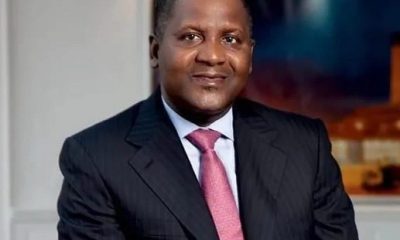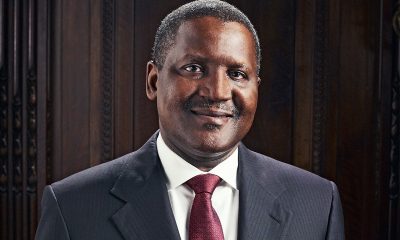Executive Director of the Dangote Group, Hajiya Halima Aliko-Dangote has urged millennials in Nigeria and across Africa to diversify from service-oriented enterprises to manufacturing and agriculture in a bid to fast-track the development of the continent and better life for its nationals.
Halima Dangote said that the economic realities around the world have shown that the way to go is agriculture and that the youths must take the lead more when most African countries are still grappling with low economic growth.
Addressing the 58th Conference of the Nigerian Bar Association (NBA) in Abuja yesterday, Hajiya Halima Dangote said African countries have groped in the dark for too long and it is high time the millennials stand up to be counted as the future of the continent.
In her paper titled “Roles of Millennials in Transition and Institution Building”, the Dangote Group Director explained that the youths have the potentials to turn around the fortune of the African continent. She stated that “Millennials are young ones born between 1980 and the mid-2000s, who account for 27% of the global population (about 2 billion people) and Sub-Saharan Africa alone is home to 13% of the entire millennial population, ranking second to Asia.
According to her, “available statistics have also revealed that by 2025, 75% of the global workforce will be millennials, large enough to influence consumer spending patterns; change consumer business models and impact the global economy. Most members of this generation are at the beginning of their careers and so will be an important engine for economic growth in the decades to come.”
Amid intermittent applause from the lawyers, Hajiya Halima Dangote stated that the theme of the conference which is “Transition, Transformation, and Sustainable Institutions” could not have come at a better time than now and therefore lauded the Association for coming up with a subject that Nigeria and Africa needed to discuss.
She congratulated the outgoing President of the NBA, Mr. A. B. Mahmoud OON, the incoming President, Mr. Paul Usoro SAN, and “all my learned friends here for successfully continuing with the vision handed down by the fathers and founders of the Association.”
The Executive Director also urged millennials and other relevant stakeholders to exercise restraint in the face common desperation for wealth by their contemporaries adding that, “Success in entrepreneurship takes time, dedication and hard work. There is a need to disabuse our mind from the concept of overnight success. Industrialisation requires patience and perseverance.”
She also spoke extensively on the successes recorded by the Dangote Group, founded by her father Aliko Dangote, in creating numerous jobs and establishing value-adding industries and contemporary businesses through importation, manufacturing and backward integration to generate and highlight local content for overall development.
While noting that the achievement by the group did not come easy, Hajiya Halima Dangote said “the Millennials should see these opportunities and diversify from service-oriented enterprises to manufacturing enterprises. Manufacturing has the capacity to create numerous jobs, develop an economy, sustain jobs and open other linkages.”
She noted that millennials are leaders in transition and are evolving. To her, “With smartphones and connections, the Millennials can exert much influence and swing the outcome of a situation. This confers on them great role and responsibility in shaping the outcome of policies and politics in a nation”.
“Economic sentiments have turned sharply since 2015. The general consensus across sub-Saharan Africa’s two largest economies is that lack of employment opportunities poses a very big problem amongst other key societal issues identified through the Sustainable Development Goals (SDGs).
“Despite these concerns, there is considerable optimism about the future, and millennials are increasingly getting more active in influencing and energising public opinion through social networks and creating mass movements. They are also actively leveraging digital fluencies to improve public sector accountability; address global societal problems and drive civil society engagement. “, she stated.
According to her, “Dangote Industries Limited is one of Nigeria’s foremost conglomerates with interests in cement, sugar, salt, flour, pasta, noodles, poly products, real estate, agriculture, logistics, telecommunications, steel, oil and gas, and beverages among others. The Group has over 15,000 direct employees. It provides indirect employment to tens of thousands of others who are engaged in activities relating to our businesses. Dangote Cement now has presence in 18 African countries (Nigeria, Ghana, Ethiopia, Tanzania, Cote d’Ivoire, Senegal, Cameroon, Liberia, South Africa, Kenya, Zambia, Sierra Leone, Congo, Zimbabwe, South Sudan, Chad, Mali and Niger).”
Speaking at a breakout session of the Conference, the Chief Executive of DAX Consult, Adaku Ufere Awoonor said millennials are the most educated and assertive age group that are currently creating wealth globally pointing out that young people around the world are now influencing outcomes of political activities, while others have risen to position of power and are making meaningful contributions to their societies.
” Millennials are entrepreneurs. If they can’t find job, they create one. They are doers and comfortable using digital media for promoting their causes,” she added.
Another Panelist speaker, Nasir Yammama, who is the CEO of Vordent AgriTech said millennials are extremely innovative, even in the face of limited resources, and challenges posed by social and political environments. He said his company is involved in creating technology that will support the agricultural sector. “We are also working on a craft, we called it “witchcraft” to help solve problems and create jobs, using technology,” he added.
In the same vein, the Managing Director of Mojec Holdings, Chantelle Oluwabumi Abdul said in spite of being a young person, her company controls about 80 percent of metering in the power sector in West Africa.
She said young people should look into creating ideas and as well execute the ideas promptly.
“I believe in the Nigerian dream. I believe in Africa. Young people now look at creating real wealth in billions and not millions again,” she added.
The sheer size of this demography which is already about half the size of world population and the democratisation of information using technology is a warning sign to future politicians and the future of politics.
“The Nigerian and African Millennials in this context although largely preoccupied with start-ups, business activities and professional success are also intensely politically and socially active through the social media”, Hajiya Halima Dangote added.
“They are thereby gradually influencing the course and content of politics and the flavour of social and political life, and social activism through the broad reach, power and immediacy of the social media. They will eventually have to enter the political arena as potential political and business leaders formed in the digital age.
“To do this, Nigerian and African Millennials must deliberately ground their transformation efforts for national and continental advancement in a deep understanding, respectful and non-abusive appreciation of their cultural heritage”, she added.
Hajiya Halima Dangote also stressed the growing need for strong institutions to manage these developments and transitions, as Africa develops. To her, the continent must transit from having strong persons to strong institutions, strong institutions with the effective executive capacity needed for sustainable development.

 BIG STORY5 days ago
BIG STORY5 days ago
 BIG STORY5 days ago
BIG STORY5 days ago
 BIG STORY5 days ago
BIG STORY5 days ago
 BIG STORY4 days ago
BIG STORY4 days ago
 BIG STORY4 days ago
BIG STORY4 days ago
 BIG STORY3 days ago
BIG STORY3 days ago
 BIG STORY2 days ago
BIG STORY2 days ago
 BIG STORY4 days ago
BIG STORY4 days ago
























